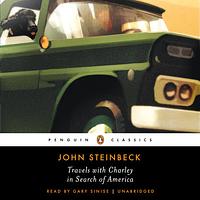Take a photo of a barcode or cover
Dit boek gaat over helemaal niks. Een man gaat op reis door zijn geboorteland met zijn poedel en vind geen antwoord op de vragen die hij had, noch antwoorden op vragen die hij niet had. De 'charme' in Steinbeck's schrijfsstijl begint meer op nostalgie dan competentie te lijken voor me. Geen enkel excuus waarom ik dit een goed boek vind. 4/5
Ook: als ik een euro kreeg voor elke keer dat ik een Steinbeck boek heb gelezen waar een gemodificeerde auto waar je ook in kan 'leven' enigszins centraal staat zou ik 2 euro hebben, wat niet veel is maar het is wel gek dat het 2x is gebeurd
Ook: als ik een euro kreeg voor elke keer dat ik een Steinbeck boek heb gelezen waar een gemodificeerde auto waar je ook in kan 'leven' enigszins centraal staat zou ik 2 euro hebben, wat niet veel is maar het is wel gek dat het 2x is gebeurd
I DNF'd because this book was an assignment for a class and i realy didn't feel like reading it
I didn't know I loved America so much! And I didn't even leave my house. "We know so little of our own geography."
I have not read much Steinbeck, but I found this old copy that belonged to my Great Aunt, and took it.
First of all, he names his vehicle. He talks to strangers and eats fresh eggs.
I have not read much Steinbeck, but I found this old copy that belonged to my Great Aunt, and took it.
First of all, he names his vehicle. He talks to strangers and eats fresh eggs.
Timeless, easygoing (mostly) American travelogue. Love the camradery between man and dog. A few things irked me- not enough about his wife and his absence. His strong experience of the South was surprising and brave.
Wonderful journey based memoir eschewing any sense of destination or goal based writing. The joy is in the small lines, the thoughts that arise from consideration of an action, a conversation, the swirling mass of life at a particular point in US history. Questions and considerations of the work's authenticity blah blah blah, but I would happily saddle up for more adventures with John and Charley. Even if it was just driving around Yonkers getting lost.
3.5
to me this was on the road except this was better
to me this was on the road except this was better
adventurous
challenging
emotional
funny
inspiring
lighthearted
reflective
relaxing
tense
medium-paced
Graphic: Racial slurs, Racism, Violence
This is definitely one of my favorite books. A huge portion of this is that I have been fortunate, due to the interests of my family and friends, to have traveled America extensively. With the exception of the South, I have more or less been everywhere that [a:John Steinbeck|585|John Steinbeck|http://photo.goodreads.com/authors/1182118389p2/585.jpg] travels and writes about over the course of the book.
The trip takes place over the fall of 1960, and some of the things which draw the author's focus is the upcoming presidential election (the extremely close Kennedy-Nixon race) and the Civil Rights movement blooming in the South. The attitudes of people about the former seemed surprisingly tepid and guarded, while for the later, they seemed guarded because the views were so fiercely divergent. Reading the end of the book where civil rights are the focus is very powerful and seems to give a penetrating look into how many individuals felt about living in such tumultuous times.
Another interesting theme in the book is Steinbeck talking about cities, and how to him they are all so similar. In particular, he talks about how they are ringed by trash, like mole hills, and he wonders about America's disposable culture. He wonders if this could possibly be sustainable (his short answer: probably not).
This book is always linked in my mind to [b:On the Road|70401|On the Road|Jack Kerouac|http://photo.goodreads.com/books/1216748331s/70401.jpg|1701188], perhaps because I read both years ago and in fairly quick succession. While [a:Jack Kerouac|1742|Jack Kerouac|http://photo.goodreads.com/authors/1287257192p2/1742.jpg] can write an interesting sentence, he never seemed to contribute any feeling or insight. Fortunately, this is where Steinbeck excels. Not only does he lyrically describe the land and the people he encountered, he also is adept and describing the mental landscape of a person traveling alone. I have taken a solo road trip once, and the isolation of driving forces one to think deeply and go out of one's way to interact with strangers. This is perhaps the greatest reason to make the endeavor. Because of my antipathy towards Kerouac, whom I feel merely documented the far more interesting, charismatic, and gifted individuals around him while giving them incredibly stupid pen names like Sal Paradise and Carlo Marx, I also enjoyed a little jab that Steinbeck seems to put towards him early on in Travels with Charley:
"When the virus of restfulness begins to take possession of a wayward man, and the road away from Here seems broad and straight and sweet, the victim must first find in himself a good and sufficient reason for going. This to the practical bum is not difficult... I set it down only so that newcomers to bumdom, like teen-agers in new-hatched sin, will not think they invented it."
The trip takes place over the fall of 1960, and some of the things which draw the author's focus is the upcoming presidential election (the extremely close Kennedy-Nixon race) and the Civil Rights movement blooming in the South. The attitudes of people about the former seemed surprisingly tepid and guarded, while for the later, they seemed guarded because the views were so fiercely divergent. Reading the end of the book where civil rights are the focus is very powerful and seems to give a penetrating look into how many individuals felt about living in such tumultuous times.
Another interesting theme in the book is Steinbeck talking about cities, and how to him they are all so similar. In particular, he talks about how they are ringed by trash, like mole hills, and he wonders about America's disposable culture. He wonders if this could possibly be sustainable (his short answer: probably not).
This book is always linked in my mind to [b:On the Road|70401|On the Road|Jack Kerouac|http://photo.goodreads.com/books/1216748331s/70401.jpg|1701188], perhaps because I read both years ago and in fairly quick succession. While [a:Jack Kerouac|1742|Jack Kerouac|http://photo.goodreads.com/authors/1287257192p2/1742.jpg] can write an interesting sentence, he never seemed to contribute any feeling or insight. Fortunately, this is where Steinbeck excels. Not only does he lyrically describe the land and the people he encountered, he also is adept and describing the mental landscape of a person traveling alone. I have taken a solo road trip once, and the isolation of driving forces one to think deeply and go out of one's way to interact with strangers. This is perhaps the greatest reason to make the endeavor. Because of my antipathy towards Kerouac, whom I feel merely documented the far more interesting, charismatic, and gifted individuals around him while giving them incredibly stupid pen names like Sal Paradise and Carlo Marx, I also enjoyed a little jab that Steinbeck seems to put towards him early on in Travels with Charley:
"When the virus of restfulness begins to take possession of a wayward man, and the road away from Here seems broad and straight and sweet, the victim must first find in himself a good and sufficient reason for going. This to the practical bum is not difficult... I set it down only so that newcomers to bumdom, like teen-agers in new-hatched sin, will not think they invented it."
adventurous
reflective
slow-paced
The last chapter in this book addresses racial discrimination in South on 1960. I found Steinbecks observations to be profound and very sad.



